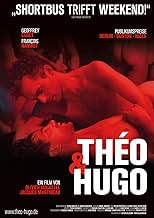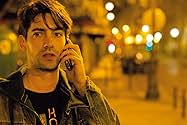CALIFICACIÓN DE IMDb
7.0/10
4.3 k
TU CALIFICACIÓN
Theo y Hugo son dos jóvenes homosexuales que se encuentran una noche durante una orgía gay en un club de sexo clandestino en París, Francia.Theo y Hugo son dos jóvenes homosexuales que se encuentran una noche durante una orgía gay en un club de sexo clandestino en París, Francia.Theo y Hugo son dos jóvenes homosexuales que se encuentran una noche durante una orgía gay en un club de sexo clandestino en París, Francia.
- Dirección
- Guionistas
- Elenco
- Premios
- 8 premios ganados y 3 nominaciones en total
Elodie Adler
- Infirmière d'accueil
- (as Élodie Adler)
Rosemine Safy-Borget
- Femme de ménage à Saint-Louis
- (as Rosemine Borget)
Opiniones destacadas
The title characters in "Théo et Hugo dans le même bateau" meet in a dark room and connect instantly. Then they stroll the streets of early morning Paris together. From its raunchy, explicit beginning, this charming film evolves into a sweet and somber romance, echoing of Richard Linklater's "Before Sunrise"-trilogy. Consequently, Théo's and Hugo's story comes across an unforgettable and ultimately very charming affair.
One can only hope that the opening-sequence of this movie (an extensive, totally uninhibited and extremely graphic account of a gay sex orgie, that takes like 15 to 20 minutes!) doesn't scare too many viewers away. This would be such a pity, because then they would also miss out on what actually is a very original, insightful and endearing feel-good movie.
Don't get me wrong: as in-you-face as the opening-sequence may be, it's absolutely crucial to the story, introducing the two main characters Hugo and Theo, and making their instant mutual attraction understandable. Maybe directors Ducastel and Martineau could have toned it down a bit and still make their point, but as it is, with no prudish restraint whatsoever, it gives the movie a very honest, almost refreshing openness, that totally fits the premise of a passionate sex contact that starts a chain of events that brings Hugo and Theo not only physical but also emotionally together.
The narrative has a clever outline, everything takes place in the last hours of the night, both guys alternately cycle, walk or run through the nightly streets of Paris (an evident metaphor for a miniature coming-of-age journey: through the dark into the light of the morning!), while in the meantime, by talking, fighting, kissing, bickering and making up again, they gradually get to know each other and more and more let their guards down.
Both actors Geoffrey Couët and François Nabot do a great job, they not only are both attractive to watch, but they are also totally convincing as the instantly smitten but cautious and tentative lovers, and one can only admire their courage to go all the way to comply with the director's need for ultimate realism.
Don't get me wrong: as in-you-face as the opening-sequence may be, it's absolutely crucial to the story, introducing the two main characters Hugo and Theo, and making their instant mutual attraction understandable. Maybe directors Ducastel and Martineau could have toned it down a bit and still make their point, but as it is, with no prudish restraint whatsoever, it gives the movie a very honest, almost refreshing openness, that totally fits the premise of a passionate sex contact that starts a chain of events that brings Hugo and Theo not only physical but also emotionally together.
The narrative has a clever outline, everything takes place in the last hours of the night, both guys alternately cycle, walk or run through the nightly streets of Paris (an evident metaphor for a miniature coming-of-age journey: through the dark into the light of the morning!), while in the meantime, by talking, fighting, kissing, bickering and making up again, they gradually get to know each other and more and more let their guards down.
Both actors Geoffrey Couët and François Nabot do a great job, they not only are both attractive to watch, but they are also totally convincing as the instantly smitten but cautious and tentative lovers, and one can only admire their courage to go all the way to comply with the director's need for ultimate realism.
This is the most mature work to date from Ducastel and Martineau, whose "Ma Vie" and "Cockles and Muscles" had reasonably wide distribution. It won't be to everyone's taste because it begins with a long, explicit sequence shot in a Paris sex club. It soon becomes apparent that the (unsimulated) sex between the two leads (Geoffrey Couet and Francois Nambot) is crucial to the plot. The lovers hope that they may be able to have a relationship; but a dreadful realisation leads to a crisis. Couet and Nambot, who are that rarity, actors who can have sex and portray characters with equal conviction, spend much of the film walking and bicycling through Paris, deserted in the early hours of the morning. These scenes are memorably shot by Manuel Marmier. A lot of viewers are going to want to re-trace their route. Along the way they meet Parisians who may have something to teach them. The final scene is beautifully written and will stay with you. All the performances are exemplary. Although the film has links with classic French cinema, notably "Cleo From 5 to 7", it is also a film of our time. It could easily become a seminal gay drama that will take its place with "Victim", "Cruising" and "Taxi zum Klo". Many other films have tried and failed to achieve the results the directors have achieved seemingly without effort.
Hugo (the handsome François Nambot) and Théo (Geoffrey Couët, who has a little of Dirk Bogarde around the eyes) meet, in a highly-explicit fashion, in a French sex club. After they put their clothes back on and head into the Paris night, their conversation about how their sexual encounter had a deeper meaning than would normally, given where it took place, be expected, indicates the start of romance. But that nascent love affair comes under strain when the confession of a mistake by one of the young men prompts a revelation from the other.
Leaving aside a few supporting characters (and plenty of non-speaking though extremely active extras in the club scene), this is pretty much a two-hander film and as such needs good central performances. Both men are competent; although there are times when his delivery is a little wooden, Couët believably handles Théo's sudden mood swings, although I can't help wondering how Nambot, who seems the more accomplished actor, would have played them. Paris by night - even the grottier parts of it in which much of this is set - looks full of character and provides a good backdrop to the young lovers' meandering conversations.
And that opening scene? Well, call me shallow, call me a hypocrite, but I prefer my nudity non-saggy, so it is a relief when the camera focuses on Nambot and Couët - although not hunks, they're definitely better-toned than many of the sex club's patrons! (But personally, if I was going to be filmed completely nude except for my shoes and socks, I'd wear nicer socks.)
Leaving aside a few supporting characters (and plenty of non-speaking though extremely active extras in the club scene), this is pretty much a two-hander film and as such needs good central performances. Both men are competent; although there are times when his delivery is a little wooden, Couët believably handles Théo's sudden mood swings, although I can't help wondering how Nambot, who seems the more accomplished actor, would have played them. Paris by night - even the grottier parts of it in which much of this is set - looks full of character and provides a good backdrop to the young lovers' meandering conversations.
And that opening scene? Well, call me shallow, call me a hypocrite, but I prefer my nudity non-saggy, so it is a relief when the camera focuses on Nambot and Couët - although not hunks, they're definitely better-toned than many of the sex club's patrons! (But personally, if I was going to be filmed completely nude except for my shoes and socks, I'd wear nicer socks.)
In his Variety review, Jay Weissberg gave this movie a passing comparison to Andrew Haigh's "Weekend," which is easily my favorite homo flick, so I had to give this one a go.
I see the similarity: a first-time encounter leads to sometime more, along, of course, with some inevitable bumps in the relationship road.
The premise of having events unfold in 'real' time is an interesting angle, almost a gimmick, that somehow works, despite a few scenes that seem to last forever: eating a twinkie ("cake") at the ER visit; a much-too-forced conversation with a fellow Metro passenger who can't afford to retire, so she commutes to a hotel housekeeping job every day; the first 18 minutes of orgy at a sex club.
The casting is another interesting angle: the leads aren't typical drop-dead-gorgeous hunks: their bodies, their faces, their *ahem* packages aren't classic attention-getters, but they're real enough, handsome enough, and equipped enough to deliver a "real man in Paris" feel. And Paris, too, certainly feels real enough, despite the early-morning setting which makes the city feel almost deserted. And almost safe to be in, public displays of affection and all.
I was surprised at how well this movie worked.
It will never win awards but it wormed its way into my heart and psyche in a way that not many others have.
Good job, co-directors Ducastel and Martineau.
It works.
I see the similarity: a first-time encounter leads to sometime more, along, of course, with some inevitable bumps in the relationship road.
The premise of having events unfold in 'real' time is an interesting angle, almost a gimmick, that somehow works, despite a few scenes that seem to last forever: eating a twinkie ("cake") at the ER visit; a much-too-forced conversation with a fellow Metro passenger who can't afford to retire, so she commutes to a hotel housekeeping job every day; the first 18 minutes of orgy at a sex club.
The casting is another interesting angle: the leads aren't typical drop-dead-gorgeous hunks: their bodies, their faces, their *ahem* packages aren't classic attention-getters, but they're real enough, handsome enough, and equipped enough to deliver a "real man in Paris" feel. And Paris, too, certainly feels real enough, despite the early-morning setting which makes the city feel almost deserted. And almost safe to be in, public displays of affection and all.
I was surprised at how well this movie worked.
It will never win awards but it wormed its way into my heart and psyche in a way that not many others have.
Good job, co-directors Ducastel and Martineau.
It works.
¿Sabías que…?
- TriviaThe intern who explains about HIV PEP treatment in the film is played by a real doctor.
- ErroresIn the metro, the old lady was supposed to get off one station before Théo and Hugo, but when they get off at Anvers you can see the old lady still in the wagon.
- Bandas sonorasThe Jail That Sets You Free
Written and Performed by Asaf Avidan
(c) Telmavar Records Ltd
(P) 2014 Telmavar Records
Avec l'aimable autorisation de Universial Music Vision
Selecciones populares
Inicia sesión para calificar y agrega a la lista de videos para obtener recomendaciones personalizadas
- How long is Paris 05:59: Théo & Hugo?Con tecnología de Alexa
Detalles
Taquilla
- Total a nivel mundial
- USD 48,227
- Tiempo de ejecución1 hora 37 minutos
- Color
- Relación de aspecto
- 2.35 : 1
Contribuir a esta página
Sugiere una edición o agrega el contenido que falta

Principales brechas de datos
What is the German language plot outline for Théo et Hugo dans le même bateau (2016)?
Responda






















